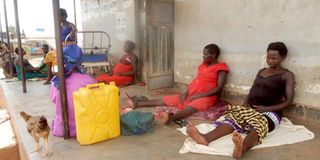Lango region women lack access to maternal healthcare services

Pregnant mothers wait to be attended to at Otwal Health Centre III in Oyam District last week. PHOTO BY BILL OKETCH
What you need to know:
- Calamity. Childbirth in Uganda is still a death trap claiming the lives of 17 mothers and 106 newborns everyday due to inadequate government investment in life-saving emergency care. However, the situation in the north appears to be unique.
- Today, many women in the region lack or have limited access to maternal healthcare services, according to a recent report.
APAC. Ms Patricia Emony was taken to Apac Hospital on June 24, 2014, while in labour. Upon reaching the facility, she was advised to seek services elsewhere.
“I was taken to Aduku Health Centre IV, where I was also rejected, because they could not handle my pregnancy complications. When I insisted, they gave me an option of signing a consent document that if I die, the health centre will not be held accountable,” says Ms Emony, a mother from Imato Imio Amor village in Apac Sub-county.
To save her life, her relatives had to dig deeper into their pockets to raise Shs700,000 in order for her to undergo caesarean section in a private health centre.
Last Friday, more than 12 women complained of poor health service delivery during a public education forum held at Te-okoo Trading Centre, Alito Sub-county in Kole District.
The mothers claimed that some health workers from Alito Health Centre III had always refused to attend to them whenever they visited the government facility.
Majority of women in Lango sub-region are complaining of harsh treatment at health centres, while a few mothers claim they are often left to deliver on their own.
“When we go for antenatal care, nurses abuse us that our underwear is very dirty and therefore they cannot work on us,” says a resident of Adyel-omwodo village in Alito Sub-county.
Ms Christine Amuge, Alito Sub-county chief, however, dismisses the allegation as untrue.
“Those are just mere allegations. Let those who claim they have been mistreated or those alleging that drugs are being stolen from health facilities produce evidence so that we can take action,” Ms Amuge says.
Ms Salume Akello, a resident of Lira District, says many expectant mothers are now seeking the assistance of traditional birth attendants (TBAs) because of lack or limited maternal healthcare services in the area.
“After visiting the toilet at the health facility, you find that there is no water for washing your hands. Sometimes we are given drugs to swallow but without water for taking the medication,” Ms Molly Aceng, a resident says, adding that drugs are always inadequate at health centres.
Health workers say they also face stressing challenges in the course of their duty.
“I am alone here and I cannot divide myself; I have to examine a patient, work in the antenatal clinic, give advice on family planning, counsel HIV patients, immunise children; all at the same time,” says Ms Christine Auma, a midwife at Ayago health centre in Lira Municipality.
With only six health workers out of the required 30 personnel, Ayago health centre receives more than 10 patients on a daily basis. However, only four health workers were present when our reporter visited the facility recently.
Mr Edmond Acheka, the assistant district health officer in charge of maternal and child health, agrees that Lira is among seven districts in the country that is doing badly in terms of maternal and child health.
Oyam acting district health officer Caroline Agaro, says: “Women are dying of preventable diseases in the course of bringing another new life. In some circumstances we either lose the mother, the baby or even both.”
The main cause of these deaths is attributed mainly to prolonged labour as a result of delay at home because there is no birth plan, she says.
Other causes include delay in seeking healthcare due to lack of transport or bad road, inadequate personnel, drugs or medical supplies, and equipment or fuel for referral.
In Otuke, traditional birth attendants TBAs have reportedly been delivering their clients in the bushes in fear that they would be arrested by the local authorities.
The practice is said to be widespread across the district, as many expectant mothers seek their services over frustration that they will not be helped when they visit health facilities.
The government has, however, stopped untrained TBAs from delivering babies; even those trained have also been stopped from conducting complicated deliveries.
Men say they prefer taking their women to traditional birth attendants because they cannot afford the services available at the private facilities.




